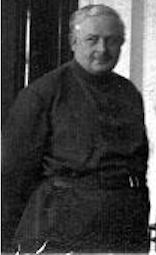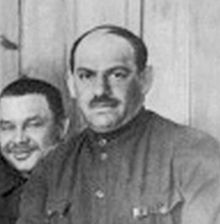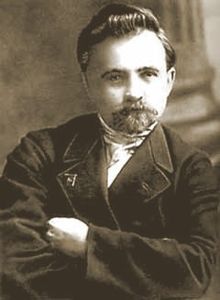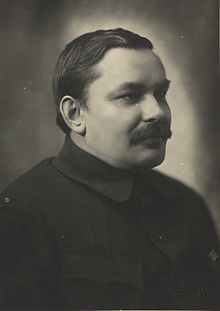<Back to Index>
- Member of the Soviet Central Committee Avel Safronovich Enukidze, 1877
- Member of the RSDRP Mikhail Mikhailovich Lashevich, 1884
- Member of the Central Committee of the RSDRP Yevgeni Alekseyevich Preobrazhensky, 1886
- Member of the Secretariat of the Central Committee Leonid Petrovich Serebryakov, 1890
PAGE SPONSOR

Avel Safronovich Enukidze (Georgian: აბელ ენუქიძე; Russian: А́вель Сафронович Енуки́дзе; May 19 [O.S. May 7] 1877 — October 30, 1937) was a prominent "Old Bolshevik" and, at one point, a member of the Soviet Central Committee in Moscow. In 1932, along with Mikhail Kalinin and Vyacheslav Molotov, Enukidze co-signed the infamous "Law of Spikelets".
Enukidze had written a book on the history of a famous Bolshevik printing press in the Caucasus which had distributed throughout Russia Vladimir Lenin's revolutionary theses during the Czarist period. Soon he was accused of having deliberately diminished Joseph Stalin's contributions to the printing press and the Bolshevik movement in Baku. In fact, Stalin had little to do with these things; it was Enukidze himself who had played the major role. But revolutionary contributions were important to a Bolshevik's prestige, and Stalin did not like Enukidze outshining him. In July 1935, after suggesting to Stalin that he give up power, Enukidze was called to account before a Central Committee Plenum in Moscow, expelled from the Party immediately, and two years later, arrested, tried and shot. According to J. Arch Getty, Nikolai Yezhov had called for his expulsion, but Stalin and Vyacheslav Molotov were reluctant. However, at Yezhov's insistence, he was expelled.
Enukidze was rehabilitated as a victim of Stalin's purges.
His family name in Russian is transliterated incorrectly as
Einukidze (should be Enukidze), and his given name as Abel (should be
Avel) in Alan Bullock's Hitler and Stalin: Parallel Lives (1993). Bullock also transliterates Enukidze as Yenukidze.

Mikhail Mikhailovich Lashevich (Russian: Михаил Михайлович Лашевич; 1884 in Odessa, Russian Empire – 30 August 1928 in Harbin, China), also known under the name Gaskovich, was a Soviet military and party leader, and member of Bolshevik Russian Social Democratic Labor Party since 1901.
After the October Revolution he held various higher military, party and governmental posts.
Once Joseph Stalin started to rise to power, Lashevich sided with Leon Trotsky. As a result, he was removed from central posts and sent to Kharbin to serve as deputy chairman of the Chinese Eastern Railway (1926 - 1928). In 1927, at the 15th Congress of the VKP(b), he was expelled from the Party, together with other Trotskyites. In 1928, after he renounced the opposition, his party membership was restored.
In August 1928 he was reported to have been arrested by Chinese authorities in connection with the Barga uprising at Hulunbuir, which was led by Merse.
Some claim that he committed suicide; others claim he died in a car accident.

Yevgeni Alekseyevich Preobrazhensky (Ru: Евге́ний Алексе́евич Преображе́нский) (1886 – 1937) was a Russian revolutionary and economist. A member of the governing Central Committee of the Bolshevik faction and, its successor, the All - Union Communist Party, Preobrazhensky is remembered as a leading voice for the rapid industrialization of peasant Russia through a concentration on state owned heavy industry.
Closely associated with Leon Trotsky and the Left Opposition
movement of the 1920s, Preobrazhensky fell afoul of the secret police
during the decade of the 1930s, suffering expulsion from the Communist
Party and internal exile in 1932 and a new arrest ending in execution in
1937 during the Ezhovshchina.
Yevgeni Alekseyevich Preobrazhensky was born in Bolkhov, Orël guberniya, Russia, on 15 February 1886 (O.S.). His father was the son of an Orthodox priest who taught for seven years in a zemstvo school before his ordination in 1883. Following his appointment as a parish priest in Bolkhov in the summer of 1883, the elder Preobrazhensky opened an elementary school for the parish at his own expense. It was in this school that Yevgeni was first educated.
In an autobiography written for the Russian Granat Encyclopedia, Yevgeni Preobrazhensky recalled both a religious and an intellectually oriented upbringing, as well as an early loathing of inequality. He was an early and active reader. After leaving his father's private school, Preobrazhensky spent two years attending the state operated Bolkhov public school. He subsequently left the town to attend the classically oriented gymnasium in the provincial capital of Orël, where Preobrazhensky remembered himself as the "second - best student in the class."
It was during his years at the Orël gymnasium that Preobrazhensky first became interested in politics, turning from the subjects taught in the classical gymnasium to reading newspapers, intellectual journals, history textbooks and socially oriented novels. He also later claimed to have abandoned his belief in God at the age of 14, as the end result of his religious upbringing clashing with the pervasive rationalist philosophy which permeated the world of the Russian intelligentsia at the turn of the 20th Century.
Preobrazhensky's philosophical rebelliousness brought him into conflict with his priestly father, who in 1902 was appointed dean of the network of church run schools in Bolkhov parish. The estrangement between father and son would last for decades.
During his fifth of eight years at the gymnasium, Preobrazhensky
began to accumulate illegal radical literature, including a proclamation
by revolutionary students of the Ekaterinoslav Mining Institute, an account of a beating of protesting students at the hands of Cossacks, and hectographed editions of radical poetry and song lyrics.
That summer, upon his return to the family home at Bolkhov,
Preobrazhensky closely reviewed this and other illegal material and
determined to himself become actively involved in the revolutionary
movement seeking the overthrow of the Tsarist regime in Russia.
Preobrazhensky decided to henceforth "devote a minimum of time to the gymnasium's subjects" — merely enough to attain passing marks — so as to dedicate the bulk of his hours to the study of history and economics. Among the budding revolutionaries who were his friends was one Alexander Aleksin, the son of a local printer, whom Preobrazhensky persuaded to steal lead type from his father's printing works with a view to establishing an illegal print shop of his own that could produce better results than a hectograph could provide.
Preobrazhensky attempted to set type for a pamphlet reproducing revolutionary song lyrics and a declaration "We Renounce the Old World," but his inferior printing equipment fell apart before he could master the process and the type was eventually returned to Aleksin's print works without any printed publications being produced.
During his seventh year at the gymnasium, Preobrazhensky felt himself compelled to choose which revolutionary organization to support, being torn between the competing strategies of the peasant oriented Socialist Revolutionary Party (PSR) and the Marxist Russian Social Democratic Labor Party (RSDLP). Influenced by the Communist Manifesto and another work by Frederick Engels, Preobrazhensky cast his lot with the latter organization, believing its approach to be scientifically based. Together with two friends, Preobrazhensky declared his formal allegiance to the RSDLP late in 1903 and was accepted into the illegal organization two or three months later.
During the summer prior to his eighth and final year at the Orël gymnasium, Preobrazhensky worked as a RSDLP propagandist to the workers of the Dyatkovo factory in Bryansky raion. Preobrazhensky was able to recruit the son of the Bryansky police to the RSDLP and successfully managed to conceal his small rotary mimeograph machine from searching authorities in a locked drawer of the inspector's own desk. Periodic meetings were held in the neighboring forest.
In the middle of October 1905, Preobrazhensky traveled to Moscow with the approval of the Moscow Committee of the RSDLP. There he was promoted to the position of chief propagandist for the urban Presnensky raion, thereby entering national politics as a party activist.
From autumn 1909 Preobrazhensky was a member of the Bolshevik Party bureau in Irkutsk.
From March 1917 he was a delegate on the Chita Soviet. At the 6th Congress of the Bolshevik Party, beginning near the end of July 1917, Preobrazhensky was elected as a candidate member (alternate) to the party's governing Central Committee.
From January 1918, he was a candidate member of the Ural Provincial Committee of the Bolshevik Party. As President of the Presidium of the Ural Regional Committee from May 1918, the killing of Nicholas II and his family occurred on Preobrazhensky's watch.
In 1918 Preobrazhensky joined the Left Communists faction opposing the draconian peace with Germany established by the Treaty of Brest - Litovsk. It was at this time that Preobrazhensky became closely affiliated with Nikolai Bukharin, himself a popular Left Communist leader and member of the party Central Committee.
Preobrazhensky was elected a full member of the Central Committee of the Russian Communist Party at its 9th Congress, which opened at the end of March 1920. He was at the same time elected to the RKP's three member secretariat.
In 1920 – 1921 was Secretary of the Central Committee; in 1921 President of the Financial Committee and a member of the Council of People's Commissars of the RSFSR; Chief of the People's Commissariat of Education. Through the 1920s he was a leading Soviet Economist, developing the plan for industrialization of the country and an opponent of the NEP.
He co-wrote the book The ABC of Communism with Nikolai Bukharin, with whom he would strongly disagree on the industrialization issue. He also wrote The New Economics, a polemical essay on the dynamics of an economy in transition to socialism, Anarchism and Communism and The Decline of Capitalism.
In 1924 he became one of the editors of the newspaper Pravda, a supporter of Trotsky as member of the Left Opposition; in 1924 – 1927 a member of the Board of People's Commissariat of Finance. After 1927, he was expelled from the party "for the organization of illegal anti - party printing house." In January 1928, he was sent to the Ural Mountains and worked in the planning agencies. In summer 1929, together with Karl Radek and Ivar Smilga wrote a letter claiming an "ideological and organizational break with Trotskyism".
In January 1930, restored to the party and appointed to the Nizhny Novgorod Planning Committee; in 1932 he became a member of the Board of the People's Commissariat of the Light Industry and acting head of the People's Commissariat of State Farms.
In January 1933, he was expelled, arrested and interrogated by the GPU and sentenced to 3 years exile; he was terminally expelled in 1936 and arrested again on 20 December 1936; on 13 July 1937 he was sentenced to death and shot. He was posthumously rehabilitated by the government of Mikhail Gorbachev in 1988.
He argued in the new economics that the USSR had to undertake the "primitive accumulation"
that early capitalist societies had had to. That is, the peasants'
agricultural surplus had to be appropriated to invest in industry. Thus
the Soviet Union had to undertake by planning in "socialist primitive accumulation" that England
had undergone by happenstance in the 17th century. This theory was
criticized politically and associated with Trotsky and the Left
Opposition, but was arguably put into practice by Stalin in the 1930s,
as when Joseph Stalin
said, in his speech to The Captains of Industry, that the USSR had to
accomplish in a decade what England had taken centuries to do in terms
of economic development in order to be prepared for an invasion from the
West. However, this argument is disputed by Trotskyists and Soviet
historians.

Leonid Petrovich Serebryakov (Russian: Леонид Петрович Серебряков) (11 June 1890 - 1 February 1937) was a Russian politician and Bolshevik victim of Joseph Stalin's Great Purge.
Born at Samara, Serebryakov was originally a metalworker. In 1905 he joined the Bolsheviks, for which he actively campaigned. After the Russian Revolution (1917) he climbed to the higher ranks in the Communist Party. In 1919 he became a member of the Secretariat of the Central Committee of the Communist Party of the Soviet Union, together with Nikolai Krestinsky and Yevgeny Preobrazhensky. The three secretaries supported Leon Trotsky when he had a dispute with Lenin over the trade unions. At the Tenth Party Congress in March 1921, Lenin's faction won a decisive victory on this dispute, and Serebryakov and the other two secretaries of the Central Committee had to resign. Afterwards he worked with Stalin on the Military Council of the Southern Front during the Russian Civil War. After Lenin's death he joined the Left Opposition of Leon Trotsky. Eventually this led to his downfall: in 1936 he was arrested for alleged membership of a terrorist Trotskyite organization. While Serebryakov was under arrest, his prosecutor Andrey Vyshinsky misappropriated his house and money. During the second Moscow Show Trial in January 1937, Serebryakov was sentenced to death after a forced confession by torture and executed shortly afterwards.
Serebryakov was rehabilitated in 1988. He was married to the writer Galina Serebryakova.